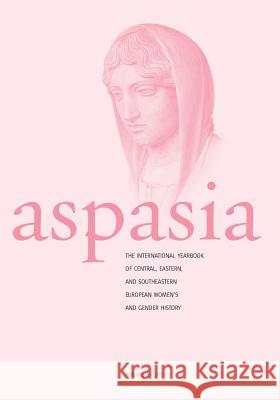Aspasia - Volume 5: The International Yearbook of Central, Eastern and Southeastern European Women's and Gender History » książka
Aspasia - Volume 5: The International Yearbook of Central, Eastern and Southeastern European Women's and Gender History
ISBN-13: 9780857453785 / Angielski / Miękka / 2011 / 252 str.
Aspasia - Volume 5: The International Yearbook of Central, Eastern and Southeastern European Women's and Gender History
ISBN-13: 9780857453785 / Angielski / Miękka / 2011 / 252 str.
(netto: 174,24 VAT: 5%)
Najniższa cena z 30 dni: 183,46
ok. 16-18 dni roboczych
Bez gwarancji dostawy przed świętami
Darmowa dostawa!
Volume 5 2011
Gendering the History of Spiritualities and Secularisms in Southeastern Europe
Guest Editors: Pam Ballinger and Kristen Ghodsee
Scholars of religion have increasingly brought secularism within the framework of critical studies of spirituality, analyzing the dialogic relationship between religions and secularisms past and present. This emerging field of "postsecularist" studies examines the multiple meanings and practices that different cultures and societies attach to the concepts of "religion," "faith," and "piety." The pieces presented in this special issue of Aspasia contribute to these larger academic debates by focusing on the multiethnic and historically pluralistic region of Southeastern Europe, an area too often ignored in larger scholarly discussions that have focused primarily on Western Europe and the so-called Third World. More important, this volume demonstrates how secularization projects are intricately interwoven with gender relations in any given society. Collectively, the contributions urge readers to draw connections between the shifting spiritual cartographies, state formations, and definitions of appropriate masculinity and femininity of particular Southeastern European societies.
Additional sections of this volume include nine Forum contributions about regional women's and gender studies, two review essays, book reviews, and an In Memoriam of Richard Stites, the influential historian of women in Russia.
Volume 5 2011
Gendering the History of Spiritualities and Secularisms in Southeastern Europe
Guest Editors: Pam Ballinger and Kristen Ghodsee
Scholars of religion have increasingly brought secularism within the framework of critical studies of spirituality, analyzing the dialogic relationship between religions and secularisms past and present. This emerging field of "postsecularist" studies examines the multiple meanings and practices that different cultures and societies attach to the concepts of "religion," "faith," and "piety." The pieces presented in this special issue of Aspasia contribute to these larger academic debates by focusing on the multiethnic and historically pluralistic region of Southeastern Europe, an area too often ignored in larger scholarly discussions that have focused primarily on Western Europe and the so-called Third World. More important, this volume demonstrates how secularization projects are intricately interwoven with gender relations in any given society. Collectively, the contributions urge readers to draw connections between the shifting spiritual cartographies, state formations, and definitions of appropriate masculinity and femininity of particular Southeastern European societies.
Additional sections of this volume include nine Forum contributions about regional womens and gender studies, two review essays, book reviews, and an In Memoriam of Richard Stites, the influential historian of women in Russia.











